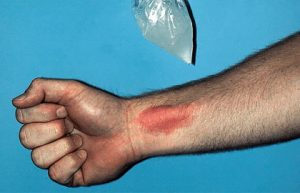Hives
Welts on skin due to cold temperature could be hives
Do you develop welts or an itchy rash after you come in from the cold, especially on skin that clothing didn’t cover?
Does your throat (or lips) swell after you drink or eat something frozen?
Have you ever developed an itchy rash or felt faint after being in cold water?
If you answered yes to any of these questions, you may have a medical condition known as cold urticaria. People who have this medical condition develop hives (welts on their skin that often itch) when exposed to the cold.

Hives
If you develop welts on your skin from the cold, it could be hives.
You may not get hives every time you encounter something cold. Some people only get hives when they swim in cold water or a cool wind hits their skin.
Others are especially sensitive and can develop hives when they walk into an air-conditioned building or linger near a freezer case in a grocery store.
Most people who get hives from the cold are otherwise healthy.
If you get hives from the cold, it doesn’t mean you have to live with flare-ups. Taking some precautions may help you avoid hives. Medication may also be necessary.
Before you take any medication, it’s important to find out if you have cold urticaria.

Hives
If you’ve had a serious reaction from cold temperatures, such as feeling faint or having difficulty breathing, it’s crucial to find out if you have cold urticaria.
How is cold urticaria diagnosed?
If you think you have cold urticaria, seeing a board-certified dermatologist can be helpful. Dermatologists often diagnose hives and care for patients who get hives.
To find out if you get hives from cold temperatures, a dermatologist will ask what symptoms you experience when exposed to cold. Be sure to tell your dermatologist if you develop any of these signs and symptoms when you’re exposed to cold:
- Welts, sometimes itchy
- Burning sensation
- Swelling and redness on skin exposed to the cold
- Lightheaded or faint feeling
- Swollen lips or swelling in the throat
Your dermatologist may also test your skin to find out how it reacts to cold. Some people are given the ice cube challenge test. If this test is necessary, your dermatologist will place a plastic bag that contains an ice cube on your bare skin, usually your forearm.
Most people who have cold urticaria develop a welt on their skin after the bag is removed and their skin starts to warm up. Even if you don’t have a welt from the ice cube challenge test, it’s possible that you could have cold urticaria. That’s why your dermatologist will ask questions and examine your skin.
How is cold urticaria treated?
If you get hives from cold temperatures, treatment can help reduce flare-ups. Treatment can be especially important if you:
- Cannot go outside in winter without getting hives
- Develop a serious reaction, such as difficulty breathing or feeling faint
The goal of treatment is to decrease your symptoms so that they don’t interfere with your daily life.
When possible, treatment begins with avoiding what causes your hives. For example, if cold water causes hives, you’ll want to avoid it. If your throat swells when you eat or drink anything cold, you should avoid all cold foods and drinks.
For many people, avoiding what causes their hives is enough to help them live comfortably.
If you’ve ever had a serious reaction from the cold, such as passing out or swelling in your throat, your dermatologist may recommend that you always carry an epinephrine pen. Injecting yourself if you have a serious reaction could save your life.
If you cannot avoid what causes your hives, medication can help. Medication can be helpful for someone who cannot go outdoors in the winter without getting hives. It can prevent hives if your child wants to swim in a pool with friends during the summer.
One medication that helps many people who have cold urticaria is an antihistamine. It can prevent hives from developing. An antihistamine can also prevent symptoms like itchiness.
If antihistamines fail to prevent hives, your dermatologist may prescribe a stronger medicine, such as omalizumab. This medication helps prevent allergic reactions. Another medication may also be an option.
Does cold urticaria go away?
Some people who have cold urticaria see it go away on its own within a few weeks or months. About half the people who get cold urticaria will see it disappear within five years. Once this happens, most patients never get hives from the cold again.
It’s also possible to have cold urticaria for life.
By seeing a dermatologist, you can find out whether you have cold urticaria. If you do, a dermatologist can help you manage it.
Images
Image 1: Used with permission of Journal of the American Academy of Dermatology: J Am Acad Dermatol. 2002;47:608-10.
Image 2: Getty Images
References
Abajian M, Curto-Barredo L, et al. “Rupatadine 20 mg and 40 mg are effective in reducing the symptoms of chronic cold urticaria.” Acta Derm Venereol. 2016;96(1):56-9.
Alba Marin JC, Martorell Aragones A, et al. “Treatment of severe cold-induced urticaria in a child with omalizumab.” J Investig Allergol Clin Immunol. 2015;25(4):303-4.
Deza G, Brasileiro A, et al. “Acquired cold urticaria: Clinical features, particular phenotypes, and disease course in a tertiary care center cohort.” J Am Acad Dermatol. 2016;75(5):918-24.
Hochstadter EF and Ben-Shoshan M. “Cold-induced urticaria: challenges in diagnosis and management.” BMJ Case Rep. 2013 Jul 8:2013.
Işk S, Arkan-Ayyldz Z, et al. “Idiopathic cold urticaria and anaphylaxis.” Pediatr Emerg Care. 2014;30(1):38-9.
Jain SV, Mullins RJ. “Cold urticaria: A 20-year follow-up study.” J Eur Acad Dermatol Venereol. 2016;30(12):2066-71.
Kim G. “Primary (idiopathic) cold urticaria and cholinergic urticaria.” Dermatol Online J. 2004;10(3):13.
Singleton R and Halverstam CP. “Diagnosis and management of cold urticaria.” Cutis. 2016;97(1):59-62.
© 2026 American Academy of Dermatology. All rights reserved. Reproduction or republication strictly prohibited without prior written permission. Use of these materials is subject to the legal notice and terms of use located at https://www.aad.org/about/legal

